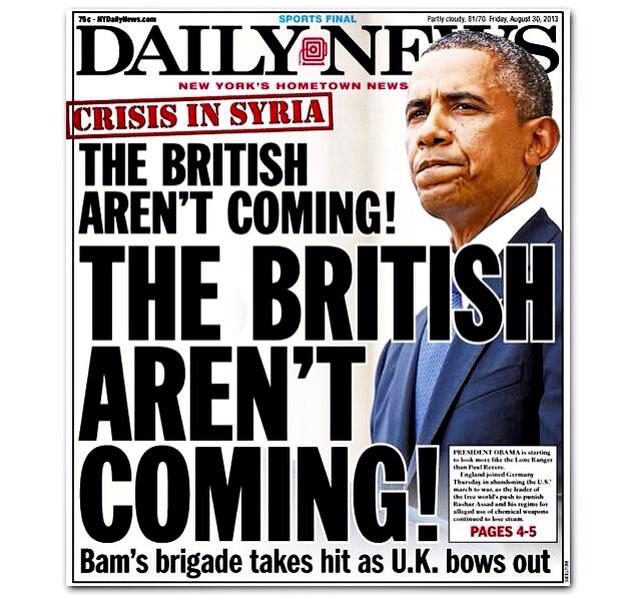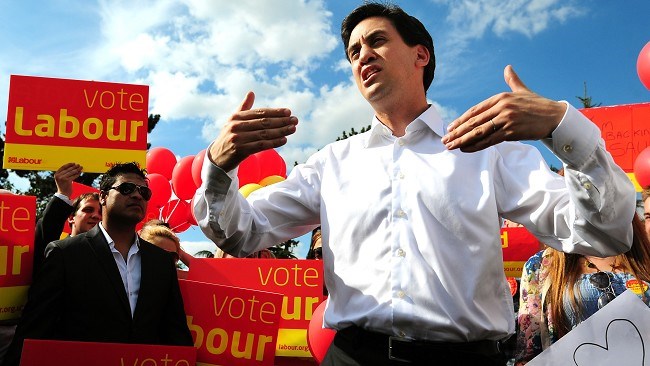
The dictum that a week is a long time in politics has never been more accurate when we consider the proposed military action against Syria and how what began as the unfolding of the same old script, dictating Britain’s eager participation in joint military action with the US, ended in a momentous defeat for the principal of interventionism.
At the beginning of the week a US-led military strike against Syria, beginning this weekend, seemed assured. Statements emanating from Washington, London, and Paris conformed to the same bellicose and Churchillian rhetoric we’ve become used to over the past decade of western military interventions and adventures. The ships and aircraft had been deployed to the region and the focus of the commentariat, political analysts, and military experts had shifted from ‘if’ to ‘when’ the attack was going to take place, with the only thing left to ponder how big, probable targets, and outcomes.
No one could have predicted that the British parliament would not only refuse to endorse David Cameron’s motion for support in principle for Britain’s participation in the military operation, but that it would also vote against Ed Miliband’s amendment supporting military action once the UN inspectors had reported back to the UN.
It shouldn’t be forgotten that both Cameron’s and Miliband’s justification for military action – i.e. humanitarian intervention bypassing the UN – would have constituted a breach of international law. No such provision exists within international law for one state or any constellation of states to take aggressive military action by themselves on this basis.
The credit for not only the British government’s defeat in the Commons, but now also the Obama administration’s U-turn with its decision to seek Congressional approval before they themselves embark on military action, lies with the British public. Opinion poll after opinion poll in the days leading up to the parliamentary debate revealed a clear consensus against military action. If the reply I received from my own constituency MP to my letter demanding a No vote is anything to go by, MPs were deluged with messages and phone calls from members of the public on the issue.
The result not only rocked the British Establishment, it has clearly rocked Washington, giving succour and momentum to a rising tide of antiwar sentiment in the US.
The shadow of Iraq undoubtedly loomed large of events this week, but so did an understanding of what the specific dynamic of the Syrian conflict involves, brilliantly argued by George Galloway in his speech during the debate. If Britain had voted to join the US and France in a combined action against Syria this week, it would have effectively meant all three countries entering a military alliance with Al Qaeda. The Nusra Front – an Al Qaeda affiliate – is the largest, best armed and funded of the opposition forces currently fighting the Syrian government, and would have been the main beneficiaries of any such military strike, lending them a morale boost at a time when the Syrian army and its allies are on the offensive.
Just pause to consider this for a moment. The British government would have been joining forces with the same ideology that was behind the atrocities of 9/11, 7/7, the Madrid bomb, and most recently and horrifically the murder of Lee Rigby in Woolwich.
So, yes, the British public certainly takes the credit for the remarkable turnaround that we’ve seen this week when it comes to British foreign policy and its relationship with Washington. Hopefully it marks the beginning of the end of the so-called special relationship, wherein Britain has consistently filled the role of obedient and eager satrap in service to US power and hegemony around the world.
At this juncture a few words need to be said about the antiwar movement.
I used to be active with the Stop the War Coalition and I still support the work they do, even if I disagree with their analysis on certain issues. The fact they’ve remained in existence this long is a laudable achievement and those involved deserve credit for remaining staunch for so long, particularly through the lean years.
Where I strongly disagree is with the assertions being made by some within Stop the War that the defeat suffered by Cameron and other pro interventionists in Syria this past week was down to them. This is false.
The bulk of the credit for this week’s vote belongs to those who’ve resisted the West’s decade long assault in the region with their lives. The Afghan and Iraqi people ensured that Britain’s military presence in their respective countries has come at a heavy price, too heavy to make anything other than a slam dunk – ala Libya – worth the risk of getting embroiled in another quagmire. By any objective measure it has been the extent of resistance to the US-led occupations of their respective countries that has truly shaped British public opinion when it comes to the concept of interventionism.
Though the bulk of the political class would never dare acknowledge it, the truth is that Britain’s military involvement in both Afghanistan and Iraq ended in military defeat. British forces were more or less chased out of Basra and lost on the ground in Helmand. In both cases they had to be bailed out by the US.
The antiwar movement’s role as a political pole of resistance has undoubtedly been a significant factor in ensuring the British public never forgets Blair’s execrable role and the lies he concocted to take the country into the war in Iraq. But if Iraq had gone according to plan – i.e. it had been pacified at none too great a cost – there is little doubt Britain’s appetite for similar ‘humanitarian interventions’ and military adventures would have continued unabated.
The role of the Iraqi and Afghan people in diminishing the British Establishment’s and a large section of British society’s addiction to war against the people of the Global South should never be forgotten.



